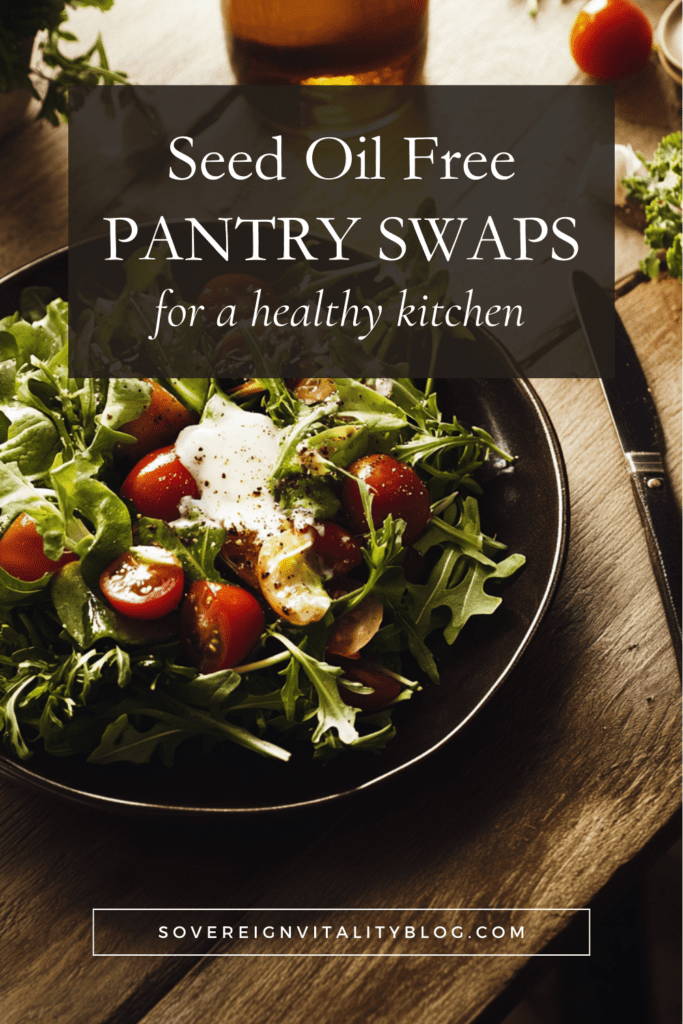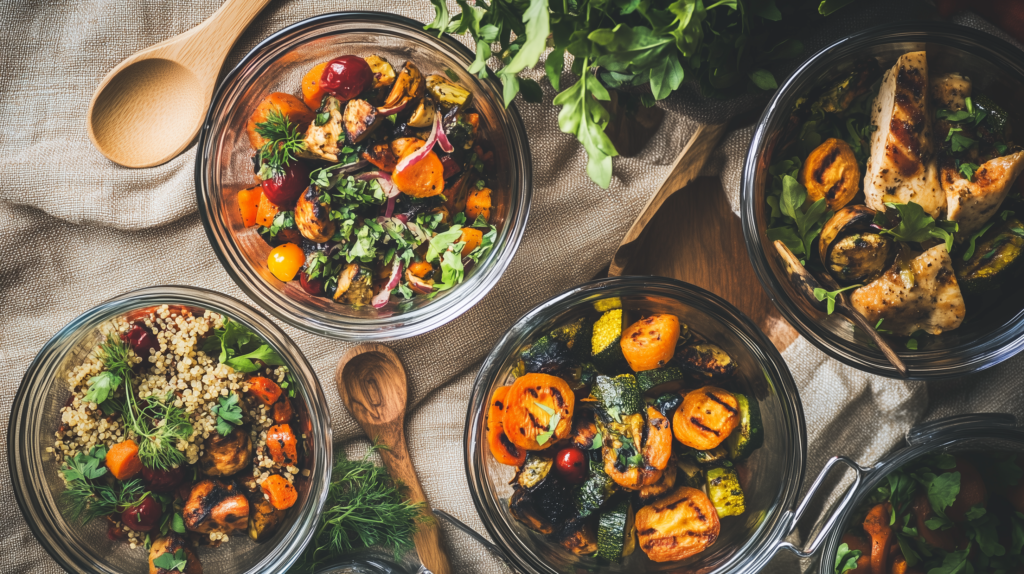This post may contain affiliate links, including those from Amazon Associates. If you make a purchase through these links, I may earn a commission at no additional cost to you. Learn more about our affiliate policy.
You may be here because you’ve heard the buzz around harmful seed oils that are pervasive in the American food supply. People have unknowingly been inflaming their bodies for decades thanks to these sneaky ingredients.
Eliminating seed oils can significantly improve your health and wellbeing. These fats, commonly found in processed foods, contribute to inflammation and chronic diseases. Americans now consume excessive amounts of linoleic acid, a pro-inflammatory omega-6 fat, due to seed oil use. Fortunately, simple pantry swaps can lead to a healthier lifestyle.
Adopting a clean eating diet or reducing inflammatory oils is easier with these pantry swaps. You’ll find healthy alternatives for the ingredients you use every day that won’t break the bank and (trust me) taste far better than the standard options.
Refresh your pantry with these wholesome options for better health!
Why Are Seed Oils Bad for Your Health?
Seed oils, like canola, corn, and soybean, are everywhere in today’s diet. Yet, they pose a significant health risk. They were developed as cheap methods of creating new versions foods that were inexpensive to make. Think margarine instead of real butter, or vegetable oil instead of beef tallow or lard.
These oils are packed with omega-6 fatty acids, which can fuel chronic inflammation. This inflammation is a major contributor to many health problems.
Which Seed Oils Are the Worst?
Most common oils to avoid:
- Canola oil
- Corn oil
- Soybean oil
- Sunflower oil
- Safflower oil
Health Risks Associated with Seed Oil Consumption
Consuming too much of these oils can lead to serious health issues. These include obesity, type 2 diabetes, and heart disease. They upset the balance of omega-6 and omega-3 fatty acids in our bodies. This imbalance can cause inflammation, linked to these chronic conditions.
Benefits of Going Seed Oil-Free
Switching to healthier fats can greatly benefit your metabolic health and overall well-being. Cutting down on seed oils can reduce inflammation, improve insulin sensitivity, and help maintain a healthy weight. It may also enhance heart health and brain function.

Essential Cooking Fats and Oil Alternatives
It’s time to rethink our cooking oils for a healthier kitchen. Seed oils like soybean, corn, and canola are everywhere in the American diet. Yet, research shows they might be harmful. These oils are high in inflammatory omega-6 fatty acids, leading to various health problems.
Fortunately, there are healthier alternatives to replace these oils. Grass-fed butter, ghee, and tallow offer stable, saturated fats that benefit our bodies. Coconut oil and extra virgin olive oil also stand out, providing health benefits and versatility in cooking.
When shopping, choose high-quality, organic, and minimally processed options. This ensures you get the most nutritional value. Switching to these healthier fats will make your meals delicious while supporting your well-being.
“Chronic, systemic inflammation is a significant factor in diseases such as obesity, metabolic syndrome, type 2 diabetes, heart disease, inflammatory bowel disease, some forms of cancer, arthritis, and Alzheimer’s disease.”
Seed Oil Free Pantry Swaps for a Healthy Diet
Creating a seed oil-free pantry is essential for your health. Focus on whole foods, organic produce, and close-to-the-source ingredients. This way, you can make tasty meals that help your body stay in balance. Let’s dive into the key food groups for a healthier kitchen.
Seed Oil-Free Pantry Swaps
The easiest way to start living seed oil-free is to replace the most common culprits in your pantry. Below, you’ll find practical “Instead of this, use this” examples for each category, along with budget-friendly suggestions.
Cooking Oils
- Instead of: Canola oil, soybean oil, or vegetable oil.
- Use this: Olive oil, avocado oil, or coconut oil.
Snacks
- Instead of: Chips and crackers fried in seed oils.
- Use this: Coconut oil-popped popcorn, sweet potato chips cooked in avocado oil, or roasted nuts (dry roasted, no seed oils).
Condiments and Dressings
- Instead of: Mayonnaise, salad dressings, and sauces made with soybean or sunflower oil.
- Use this: Olive oil-based dressings, avocado oil mayonnaise, or homemade condiments.
Breakfast Foods
- Instead of: Granola and cereals with seed oils.
- Use this: Homemade granola with oats, nuts, and honey or seed oil-free cereals.
Baking Supplies
- Instead of: Pre-mixed baking kits and seed oil-based margarine.
- Use this: Coconut flour, almond flour, and grass-fed butter.
Reading Labels: How to Identify Hidden Seed Oils
Shopping for groceries can be confusing when trying to avoid hidden seed oils. Like a modern version of hunting and gathering! Yet, with some knowledge, you can master the art of label reading. The trick lies in scrutinizing the ingredient list, not the flashy front-of-package claims.
Be on the lookout for terms like “vegetable oil,” “soybean oil,” “corn oil,” and “sunflower oil.” These are common cheap fillers in many processed foods, from snacks to baked goods. Also, be cautious of any ingredients you can’t pronounce. They might be derived from seed oils.
Another indicator is the sugar and carb content. High amounts of added sugars and refined carbs often mean seed oils are present. Opt for products with a carb-to-fiber ratio under 5:1 for healthier choices.
- Avoid marketing claims and focus on the ingredient list
- Watch out for words like “vegetable oil,” “soybean oil,” and other seed-based oils
- Be cautious of unfamiliar or unpronounceable ingredients
- Look for a carbohydrate-to-fiber ratio of less than 5:1
By honing your label-reading skills and avoiding hidden seed oils, you can improve your health. Opting for whole, minimally processed foods is the best way to steer clear of these oils.
“Becoming a label-reading pro is one of the best things you can do for your health. It’s your secret weapon against hidden seed oils and other unwanted additives.”
Clean Protein Sources and Meat Products
Building a healthy, sustainable diet hinges on the quality of your protein sources. Move away from processed meats and choose grass-fed and pasture-raised options. Grass-fed beef and lamb are rich in nutrients, offering a grass-fed meat boost. Meanwhile, pasture-raised chicken and turkey provide lean, organic protein sources.
Grass-Fed and Pastured Options
- Grass-fed beef and lamb
- Pasture-raised chicken and turkey
- Nitrate-free, organic bacon from brands like Applegate Farms
Seafood Selections
For a healthy dose of wild-caught fish, seek out sustainably sourced seafood. Wild-caught salmon, tuna, and cod are rich in omega-3 fatty acids. These nutrients support brain and heart health.
Plant-Based Proteins
Add a variety of plant-based protein sources to your diet. Lentils, chickpeas, and organic tofu are great options. Steer clear of processed meat alternatives, which often contain seed oils and additives.
- Lentils
- Chickpeas
- Organic tofu
“Choosing high-quality, unprocessed protein sources is a key step in nourishing your body with the nutrients it needs for optimal health and energy.”
Dairy and Alternative Products Without Seed Oils
Choosing the right dairy and non-dairy alternatives is crucial. Avoid products with seed oils, as they can lead to inflammation. Instead, opt for full-fat dairy like grass-fed butter, cheese, and plain organic yogurt. These options are not only seed oil-free but also packed with vitamins and minerals.
For those who prefer non-dairy alternatives, be cautious of ingredients. Look for seed oil-free milk substitutes from almonds, coconuts, or other plants. Avoid products with added sugars or thickeners, as they can also cause inflammation. Always read labels and choose high-quality, minimally processed options to support a healthy lifestyle.
By making informed choices in the dairy and alternative product aisles, you support your body’s natural anti-inflammatory processes. Enjoy the nutritional benefits of these versatile ingredients.

Snacks and Convenience Foods
Finding seed oil-free snacks can be a challenge. Yet, with some effort, you can find tasty, healthy options. These alternatives will curb your cravings without harming your health. Let’s look at some seed oil-free snack options, both store-bought and homemade, and some emergency snacks to keep handy.
Store-Bought Options
Look for seed oil-free snacks like Mary’s Gone Crackers, Hu crackers, and Lesser Evil popcorn. These brands use fats like coconut oil or avocado oil. They offer a crunchy snack without the inflammation caused by seed oils.
Easy Homemade Alternatives
Consider making your own seed oil-free snacks. Roasted nuts, kale chips, and fresh veggie sticks with guacamole are great. They’re easy to make and full of nutrients.
Emergency Snack Ideas
Keep some emergency snacks ready for quick, healthy boosts. Paleovalley beef sticks, fresh fruit, and hard-boiled eggs are good choices. They’re portable, packed with nutrients, and don’t rely on seed oils.
By choosing seed oil-free snacks, you can enjoy tasty, healthy options. These choices support your health and well-being.
“An estimated 60 percent of chronic diseases could be prevented with a healthy diet.”
Budget-Friendly Shopping Strategies
Eating affordable healthy meals is achievable with some planning and smart shopping. You can enjoy nutritious, anti-inflammatory foods without overspending. Focus on a clean eating meal plan, and using seasonal produce to save money.
Begin by planning your meals for the week. This helps you create a detailed grocery list and prevents impulse buys. Choose recipes that feature affordable healthy ingredients like beans, lentils, whole grains, and frozen fruits and veggies. Buying pantry items in bulk can also cut costs over time.
For fresh produce, choose items in season. Seasonal fruits and vegetables are cheaper and more nutritious. Visit your local farmers market or join a CSA (Community Supported Agriculture) program to get the freshest seasonal produce.
By using these budget-friendly strategies in your meal planning and grocery shopping, you can enjoy tasty, affordable healthy meals without spending too much.
Conclusion
Adopting a seed oil-free lifestyle is a significant step towards a healthier, more sustainable future. By making simple changes in your pantry and being aware of ingredient labels, you can greatly reduce inflammation. This supports your metabolic health and allows you to enjoy a variety of delicious, nutrient-rich foods.
Small changes can lead to significant improvements in your well-being. Adding anti-inflammatory foods like oily fish, berries, turmeric, and nuts to your diet gives your body a boost of antioxidants and essential nutrients. By focusing on a healthy lifestyle, seed oil free living, and sustainable habits, you’re investing in your long-term health and setting yourself up for success.
With the knowledge and tools from this article, you’re empowered to make informed choices and take control of your wellness journey. Embrace this transition with enthusiasm, and enjoy the many benefits of a seed oil-free lifestyle.



